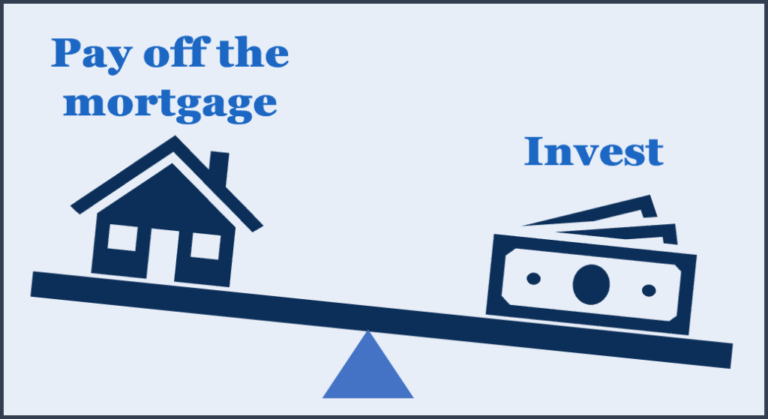Paying Off Mortgage or Investing: Making the Best Financial Decision in 2023
- Home
- Blog

In today’s uncertain economic climate, making wise financial decisions is crucial for securing our future and achieving financial freedom. Among the many choices’ individuals face, one of the most debated topics is whether it is better to pay off a mortgage early or invest the money in various financial instruments. Both options have their merits and drawbacks, and understanding the nuances can help you make a well-informed decision that aligns with your long-term goals. In this blog, we will explore the advantages and disadvantages of both paying off your mortgage and investing in 2023, to assist you in making the best choice for your financial situation.
Paying Off Mortgage: The Advantages
- Peace of Mind and Reduced Financial Stress: One of the primary advantages of paying off your mortgage early is the peace of mind it brings. Knowing that you own your home outright can significantly reduce financial stress, especially during uncertain economic times. Without monthly mortgage payments, you will have more financial flexibility to pursue other goals.
- Interest Savings: By paying off your mortgage early, you can save a substantial amount on interest payments over the life of the loan. This can translate into significant savings, especially with long-term mortgages.
- Increased Equity: Paying off your mortgage will increase your equity in the property. Having more equity can be beneficial if you plan to access a home equity line of credit (HELOC) in the future, which can be used for home improvements or other financial needs.
Paying Off Mortgage: The Disadvantages
- Opportunity Cost: One of the main drawbacks of paying off your mortgage early is the opportunity cost. The money used to pay off the mortgage could have been invested in other assets that potentially offer higher returns over the long term.
- Lack of Liquidity: Investing a significant amount of money in your home means tying up those funds in an illiquid asset. It may become challenging to access that money quickly in case of emergencies or unexpected expenses.
- Lower Returns: Historically, real estate appreciation rates have been moderate compared to returns from a well-diversified investment portfolio. By solely focusing on mortgage payoff, you might miss higher returns in the financial markets.
Investing: The Advantages
- Potential for Higher Returns: Investing in various assets such as stocks, bonds, and mutual funds has the potential to generate higher returns compared to the interest rate on your mortgage. Over the long term, the stock market has historically outperformed real estate in terms of returns.
- Diversification: Investing allows you to diversify your portfolio, spreading your risk across different assets. This diversification can provide better protection against market volatility and economic downturns.
- Liquidity and Flexibility: Unlike a paid-off home, investments are generally liquid and can be easily accessed if needed. This liquidity offers you the flexibility to respond to unforeseen circumstances or take advantage of investment opportunities.
Investing: The Disadvantages
- Market Volatility: All investments come with a certain level of risk, especially in the short term. Market volatility can lead to fluctuations in the value of your investments, potentially resulting in temporary losses.
- Debt Burden: Taking on mortgage debt can be stressful for some individuals. By choosing to invest instead of paying off your mortgage, you will continue to have mortgage payments and interest expenses.
- Discipline and Knowledge: Successful investing requires discipline and a good understanding of the market. If you lack the time or knowledge to manage your investments properly, you might not achieve the desired returns.
Finding the Middle Ground
Instead of viewing the decision as an either/or scenario, consider finding a middle ground that suits your financial objectives. Here are some strategies to strike a balance between paying off your mortgage and investing:
- Build an Emergency Fund: Before aggressively paying off your mortgage or investing, ensure you have an emergency fund that covers at least 3 to 6 months’ worth of living expenses. This fund will provide a safety net during unexpected situations.
- Maximize Retirement Contributions: Focus on maximizing contributions to retirement accounts, such as 401(k)s or IRAs. These tax-advantaged accounts offer compounding growth and can significantly contribute to your long-term financial security.
- Refinance Your Mortgage: If you have a high-interest mortgage, consider refinancing to lower rates. This can free up more money for investing while still allowing you to pay off the mortgage within a reasonable time frame.
- Consult a Financial Advisor: Seeking advice from a qualified financial advisor can help you create a personalized financial plan that addresses your specific goals and risk tolerance. They can help you navigate the complexities of paying off your mortgage versus investing.
Current Economic Conditions
When making financial decisions, it is essential to consider the current economic landscape. In 2023, the economy might be experiencing various trends that can influence the decision-making process:
- Interest Rates: The prevailing interest rates can significantly impact the financial benefits of paying off a mortgage early. If interest rates are historically low, it might be more attractive to invest the money in higher-returning assets rather than paying off a low-interest mortgage.
- Housing Market: The state of the housing market can influence property values and potential returns on real estate investments. Understanding local housing market trends can help you assess the feasibility of investing in property.
- Market Performance: The performance of financial markets, such as stocks and bonds, can sway your investment decisions. Historical data and expert analysis can give you insights into market expectations and potential returns.
Tax Considerations
Taxes play a vital role in the overall impact of both paying off your mortgage and investing. Here are some key tax considerations:
- Mortgage Interest Deduction: In some countries, homeowners may be eligible for mortgage interest deductions on their taxes. This deduction can lower the effective cost of a mortgage, making it less expensive compared to higher-interest debts.
- Capital Gains Tax: When selling investments, you may be subject to capital gains tax, depending on the holding period and the type of investment. Understanding the tax implications of your investments is essential for accurate financial planning.
Investment Strategies
If you decide to invest rather than paying off your mortgage, consider the following investment strategies:
- Dollar-Cost Averaging: Instead of investing a lump sum, dollar-cost averaging involves investing a fixed amount regularly over time. This strategy can mitigate the impact of market volatility.
- Asset Allocation: Diversifying your investments across different asset classes, such as stocks, bonds, real estate, and cash, can help manage risk and improve overall portfolio performance.
- Retirement Accounts: Contributing to retirement accounts like Roth IRAs or Traditional IRAs can provide tax advantages and a disciplined approach to long-term saving and investing.
Personal Circumstances
Ultimately, your personal circumstances and financial goals will be the most significant factors in making this decision:
- Risk Tolerance: Consider your comfort level with risk and volatility. If you prefer a more conservative approach, paying off your mortgage might be the better choice. On the other hand, if you have a higher risk tolerance, investing might align better with your financial goals.
- Other Debts: Evaluate your overall debt situation. If you have higher-interest debts (e.g., credit card debt or high-interest personal loans), prioritizing their repayment before investing might be more financially prudent.
- Financial Goals: Clarify your short-term and long-term financial goals. Whether it is retiring early, funding education for your children, or traveling, aligning your financial decisions with these goals is essential.
The decision of whether to pay off your mortgage or invest in 2023 depends on various factors, including your risk tolerance, financial goals, and current economic conditions. While paying off your mortgage early can provide emotional relief and interest savings, investing offers the potential for higher returns and increased liquidity. Finding a balanced approach that suits your unique financial situation is essential. Remember that each person’s circumstances are different, and there is no one-size-fits-all answer. By carefully considering the advantages and disadvantages of both options and seeking professional advice when needed, you can make an informed decision that aligns with your long-term financial objectives.

